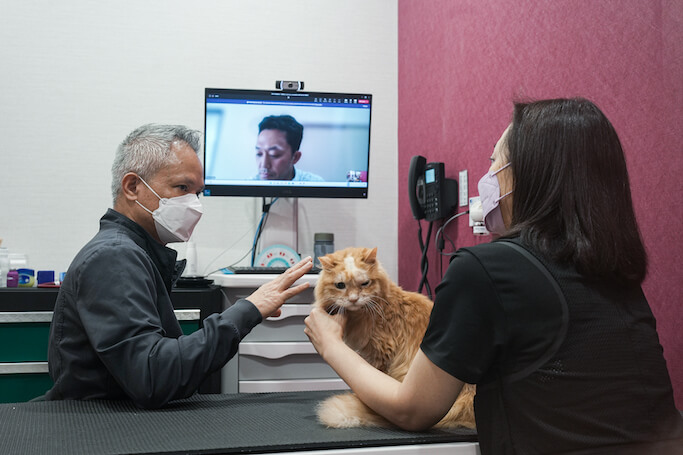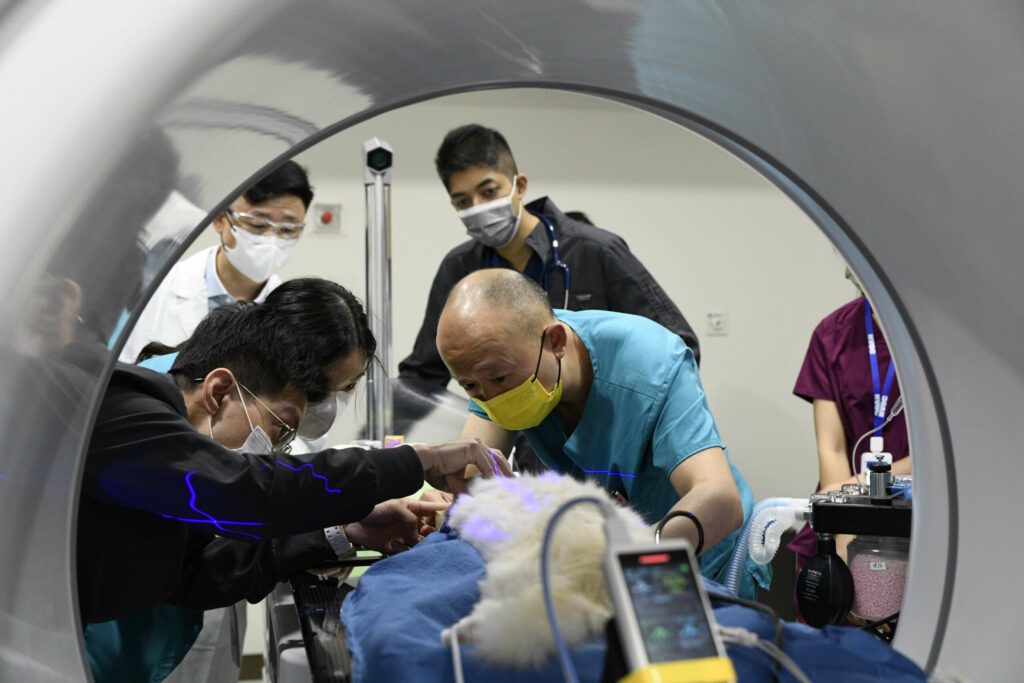ONCOLOGY SERVICES

There are many types of cancer treatment. The type of treatment that your animals will receive depends on the type of cancer involved and how advanced the cancer has developed. Some animals with cancer need only one treatment. But most of the others require a combination of treatments, such as surgery with radiation therapy and systemic treatment (e.g. chemotherapy). There is a lot to learn and think about when your pet needs cancer treatment. Our veterinary experts will patiently explain the types of diagnosis and treatment needed so that you know what lies ahead and feel more in control.
Oncologist Consultation
Our experienced veterinary oncologists are dedicated to treating each animal through a collaborative approach, broad technology application and evidence-based treatment options. The steps in the diagnosis and treatment of cancer generally include examining and taking care of the animal, characterizing and locating the tumour and determining the most appropriate treatment. We always strive to ensure that we get an accurate diagnosis before starting treatment and that the treatment is what the patient is able to cope with.
Telemedicine
Veterinary telemedicine services work in much the same way as human telemedicine. You can initiate a request and provide information about your pet’s condition. Our centre will, through a digital channel, arrange a meeting at which an overseas expert veterinarian can discuss with you about your pet’s case, provide diagnosis and treatment recommendations and make a prescription.

Cancer Surgery
Our veterinarians are experienced in handling all forms of solid tumours and reconstructive surgery. Areas of expertise include the treatment of mast cell tumours, soft tissue sarcomas, tumours inside the mouth (oral tumours), in the chest (thoracic tumours), and in the abdomen (abdominal tumours).


Radiation Therapy (RT)
The principle of Radiation Therapy (RT) is using high-energy photon beams to destroy the DNA in cancer cells, so that they can no longer proliferate, thereby killing the cancer cells and shrinking the tumours. Read More
- Curative RT
- Adjuvant RT
- Palliative RT
- Conventional Radiation Therapy
- Stereotactic Radiation Therapy (SRT)
Every Treatment is Precise and Individualised. Click here to view the flowchart
- Acute side effects
- Late side effects

Medical Therapy
Chemotherapy
Chemotherapy deploys drugs to effectively kill cancer cells. In addition to curing cancer, chemotherapy drugs can also slow down the growth of cancer cells, reduce the chance of spread(metastasis)and relieve the discomfort caused by tumours. As chemotherapy often works by attacking rapidly dividing cells, healthy cells can also be harmed. Our professional medical team will suggest strategies to minimize and manage the side effects. We fully understand the importance of maintaining the quality of life of the animal. Our healthcare professionals will therefore continue to monitor and take care of our patients throughout the whole treatment process.
Electrochemotherapy
Electrochemotherapy is a type of chemotherapy that allows the delivery of non-permeant drugs to the cell interior. It is based on the local application of short and intense electric pulses that transiently permeabilize the cell membrane, thus allowing transport of molecules otherwise not permitted by the membrane
When a biological cell is exposed to an electric field of sufficient strength, an increase in the transmembrane voltage is generated, which leads to rearrangements of the cell membrane structure. These changes result in an increase of the cell membrane permeability, which allows nonpermanent molecules to enter the cell.
When a biological cell is exposed to an electric field of sufficient strength, an increase in the transmembrane voltage is generated, which leads to rearrangements of the cell membrane structure. These changes result in an increase of the cell membrane permeability, which allows nonpermanent molecules to enter the cell.
Targeted Therapy
Targeted therapy blocks the transmission of cancer cells’ growth signals. It works by interfering with specific molecules (targets) involved in cancer cell growth and survival. Targeted therapy therefore affects cancer cells more than normal cells and hence has relatively fewer side effects.
Immunotherapy
Immunotherapy deploys the latest cancer treatment drug which activates our own immune system to fight cancer cells. In recent years, there have been significant advances in the development of cancer immunotherapy. Its efficacy on different caners is being investigated. More and more cancer patients will benefit from it in the foreseeable future.


